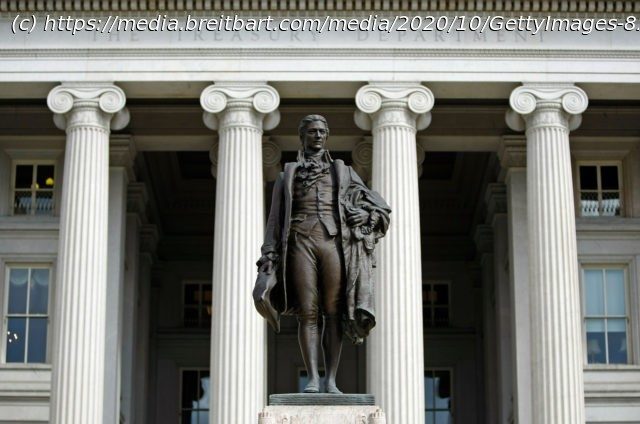The U.S. government spent more than $3.13 trillion than it collected in taxes in fiscal year 2020, borrowing the difference from investors in …
The U.S. government spent more than $3.13 trillion than it collected in taxes in fiscal year 2020, borrowing the difference from investors in the U.S. and abroad, the Treasury Department said Friday. At the same time, interest rates have plummeted. The yield on the 10-year Treasury is down 57 percent from the expiration of the last fiscal year. Federal revenue from taxes, fees, and other charges totaled $3.42 trillion, a one percent decline from the 2019 fiscal year, due to the contraction of the economy as the pandemic and measures to fight its spread took hold. Most of the shortfall occurred after March, when large parts of the economy were brought to a halt in an attempt to arrest the spread of coronavirus. The Trump administration’s budget, authored months prior to the pandemic, had projected revenues of $3.7 trillion, $286 billion higher than what the government collected. Spending rose 47 percent to $6.5 trillion, largely due to the four pandemic relief bills passed by Congress in March that authorized an aggregate of $2.4 trillion in spending. The largest of these, the CARES Act, came with a $1.7 trillion price tag. The Trump administration’s budget had estimated spending would come in $1.762 trillion lower than it did, about the size of the CARES Act. The U.S. government considers money taken from workers and businesses through the tax system to be “revenue,” although unlike private sector revenue it is received not through voluntary sales transactions but mandatory collections. The largest source of tax revenue is individual income taxes, which collected $1.6 trillion in 2020. That was $203 billion lower than the budget estimate and about $100 billion below the prior year’s revenue. It was around $23 billion more than the U.S. government collected in income taxes in fiscal year 2017, the last year before the Trump administration’s reforms cut taxes for almost all U.S. taxpayers. When the government spends more than it collects in taxes—as it has nearly every year in recent decades, apart from a brief surplus in the late 1990s—it turns to investors to borrow funds.
Start
United States
USA — Financial U.S. Budget Deficit Tripled to $3.1 Trillion as Pandemic Hit Economy






